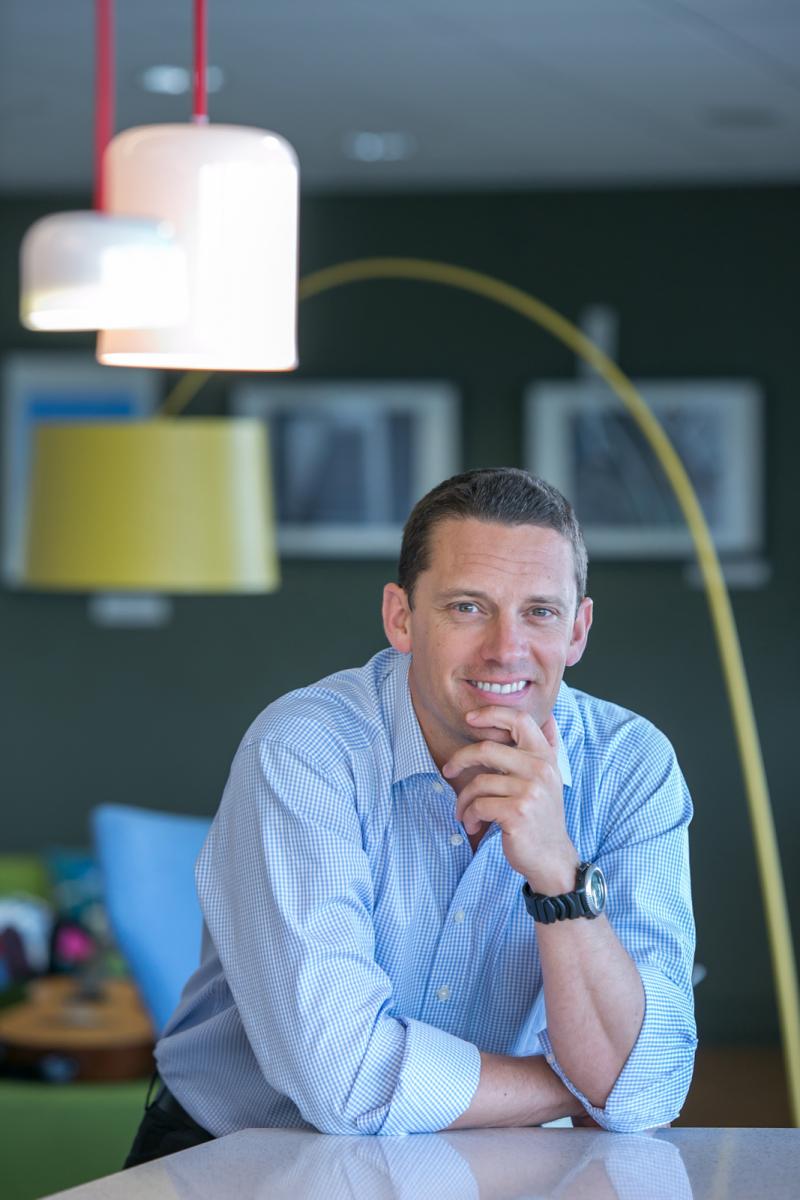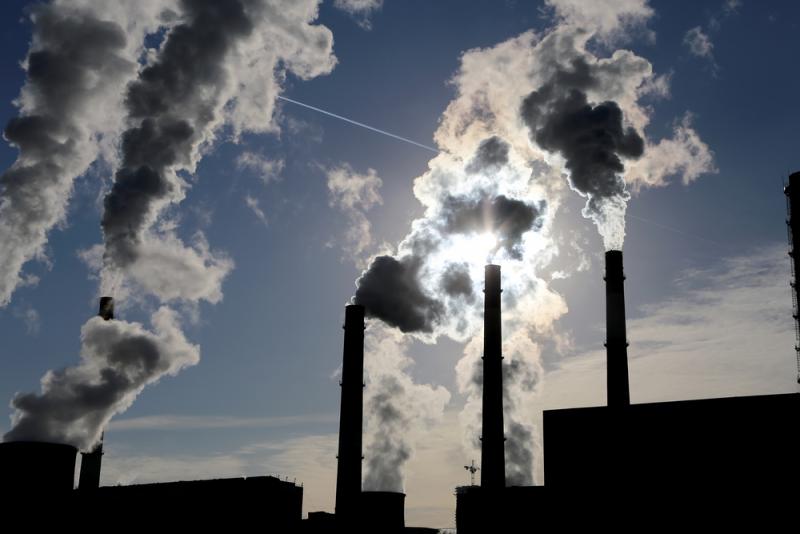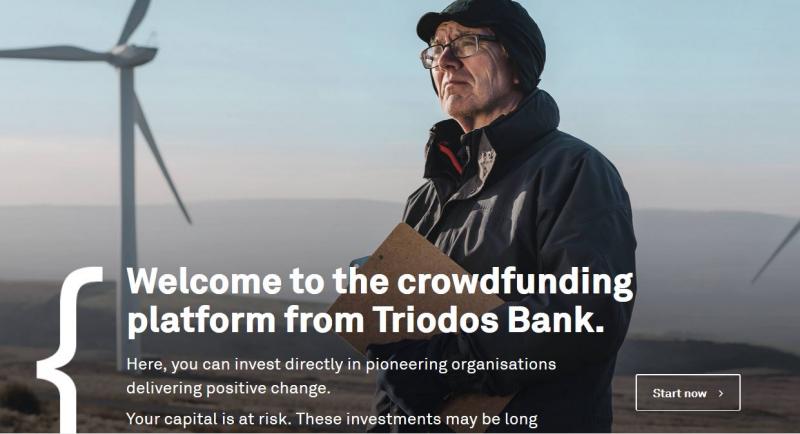The former environmentalist who heads up the UK’s leading ethical bank talks to Oliver Balch about natural capital, profit with a purpose, and aligning lending with the SDGs and the Paris Agreement
Credit committee meetings aren’t normally memorable affairs. Yet Bevis Watts recalls one such meeting in particular. The proposition on the table was for a sizeable loan to a charity-run start-up. The “business”: providing a rural retreat for children from challenging backgrounds where they can interact with animals and enjoy nature.
“It wasn’t an easy lend,” the 42-year-old managing director of Bristol-based bank Triodos UK concedes. “But we helped them with their first farm and now, many years later, they have three – and we’ve helped them with each.”
Jamie’s Farm, near Bath, (main photograph) is one of hundreds of positive impact enterprises that have turned to Triodos UK since it set up operations in 1995. The UK branch of Netherlands-based Triodos Bank NV (which also counts operations in Spain, Belgium and Germany), it is widely touted as the primary ethical lender of choice.
But what does “ethical” banking actually entail? And, assuming it isn’t an oxymoron given our post-credit crunch, post-bailout, mega-bonus world, what disruption is it causing – can it cause? – for the money-bagging banks of the mainstream?
We only do 100% positive stuff, by which I mean things that demonstrate social environmental value
Bevis is on well-practised ground here and his response is swift: “We do positive things with money.”
In the renewables sector, Triodos is widely considered the “go-to bank”. Last year, the bank’s European operations clocked up 68 separate deals (netting it top spot on Clean Energy Pipeline’s global league tables for the third consecutive time).
But Triodos’ expansive portfolio also extends to organic farmers (it’s the Soil Association’s bank), environmental tech manufacturers and “ecological developers” (eco-housing mostly).

Bevis Wats of Triodos UK. (Credit: Triodos)
In the social and cultural space, meanwhile, its loan book runs from grassroots regeneration projects and microfinance firms to community theatres and leisure facilities. There’s even a category for organizations dedicated to the “philosophy of life” (ashrams, yoga retreats and the like).
“We only do the 100% positive stuff, by which I mean things that demonstrate positive social environmental value,” Bevis clarifies.
Instinctively, this eclectic portfolio sits well with him. After focusing on corporate environmental management in his business degree, Bevis spent six years working for the government recycling agency WRAP and a further three years running a conservation charity (the Avon Wildlife Trust).
I think the financial sector has a hugely overinflated view of its own self worth to society
Then there was the extended sabbatical volunteering as a scuba-diving coral conservationist in the Philippines, evidenced by his predilection for kicking off slide-show presentations with pictures of marine wildlife.
But Bevis is no long-haired hippy who mistook Triodos UK’s energy-efficient office block for a surf shed or ocean aquarium. Serious and straight-talking (with close-cropped hair, for what it’s worth), he knows the banking game inside out.
Before joining as managing director in 2016, he spent from 2008 to 2012 as head of business banking – a period during which Triodos UK’s loan book quadrupled to around £640m. (The bank’s UK balance sheet now exceeds £1bn).

Triodos prides itself on adapting to clients' changing needs. (Credit: Triodos)
Yet, compared to the Merrill Lynches and HSBCs of this world, Triodos remains a minnow. Its latest results put its total profit last year at a mere €39m, with assets under management at €14bn (HBSC, by comparison, cleared $4.8bn profit in just the first three months of this year). What hope is there of disrupting the titans of corporate finance?
Bevis knows that Triodos is going against the tide. The big banks may talk a more ethical game these days, but remain as doggedly committed as ever to “making profit for its own purpose”, he says.
Ten years on from the credit crunch, little fundamentally has changed, Bevis says: “I think the financial sector has a hugely overinflated view of its own self worth to society. Banking has tended to operate in a bubble.”
The banks of the future will be the ones that have a strong social purpose
So is he hopeful change can happen? Of course he is. As a bank, Triodos prides itself in understanding societal needs, adapting to clients’ changing demands and generally keeping ahead of the curve.
“The banks of the future will be the ones that have a strong social purpose and are actually connected to the society and the environment that they work within, not disconnected from it,” he says.
Critical to change is banks becoming more transparent. According to research that Triodos carries out during Good Money Week every year, the idea that bank account holders are happy to hand over their money, collect a few percent interest and ask no questions is fast disappearing. Around three in four of those interviewed for the bank’s surveys now say they want to know what their money is doing and what impact their savings are having.

All Triodos’s loans are available online for anyone to see. It has also started publishing an annual verified account of its contribution as a bank to the United Nations’ Sustainable Development Goals.
“If every bank had to publish every loan and investment they make worldwide … then I think a lot of people would change their minds about what they're doing with their banks and their pension funds and so on.”
Another area where Bevis is trying to push forward the agenda is around the issue of natural capital. He describes the concept, which seeks to valorise the tangible benefits for society that a healthy, well-functioning ecosystem delivers, as “a bit of a holy grail”.
'Going wrong', at present, is understood by regulators in financial terms only
Bevis would love it if every bank developed internal evaluation mechanisms to incorporate the positive or negative impacts of their financing decisions on society and the planet. Realistically, however, he suspects it will probably need governments to adapt regulations to incentivise banks to change their thinking.
One route forward here would be to change risk capital weightings, he argues. Banks are currently required to hold a certain level of capital against the loans they make. The more chance of the deal going wrong, the more money banks need to set aside. “Going wrong”, at present, is understood by regulators in financial terms only. Were it to include social or environmental damage as well, he says, then the investment landscape would change overnight.
“If you were to look at fossil fuels and so forth, you'd say, “actually this continued dependency on carbon carries with it enormous societal risk, so let's put a higher risk weighting on those assets . . . These [high-carbon] sectors would then be less profitable for the banks and you would find less availability of finance for those industries in the market.”

Watts advocates putting a higher risk weighting on high-carbon sectors. (Credit: VLADJ55/Shutterstock)
It’s just the kind of solution that an ethical disruptor from within the banking sector would come up with. In an attempt to build momentum for the idea, Triodos sponsored a major UK conference on the subject back in March.
Bevis’s belief in transparency and impact investing is also evident in the bank’s new crowdfunding website. Launched in February, it allows UK residents to invest directly in equity or bonds issued by organizations delivering positive social and environmental impact.
Ultimately, we get the banks we want – the banks we deserve
As well as innovating and signposting others, effecting change for a small player in a crowded field requires co-operation with others. The notion of being “part of a web” is a lesson Bevis took away from his time at the Avon Wildlife Trust. The charity had only 40 or so core staff, but could draw on the support of 1,500 or more regular volunteers.
“In coming back to the bank, I really wanted to make what I'm trying to do here less about the bank and more about this narrative of future change that we're trying to generate and how we want to supportively influence banking,” he says.
To that end, Triodos helped found the Global Alliance for Banking on Values, an international movement of nearly 50 banks, credit unions, banking co-operatives, microfinance firms and other progressive financial institutions committed to “advancing positive change” in banking. In association with advocacy groups Finance Watch and Mission 2020, the alliance published a white paper last September asking what banks would look like if the financial industry was to be “repurposed”.
Triodos UK’s parent company has given a partial answer to that question. Together with 25 other banks around the world, Triodos signed up to a new United Nations-backed initiative in late May that calls on banks to align their business objectives with the UN Sustainable Development Goals and the objectives of the Paris Climate Agreement. The draft principles will be published for global consultation at the UNEP Finance Initiative's Global Roundtable in November in Paris.
The move is in keeping with Bevis’s belief in the need for forward-thinking banks to – literally – put their money where their mouth is. That means being accountable for their impacts, pointing a way forward and, ultimately, proving that they can be “socially useful”.
Banks, however disruptive their appetite, can only do so much, he maintains. In the end, it requires all of us who hold bank accounts to engage with how our money is being used and demand more of our financial institutions.
As the only qualified environmentalist ever to head a UK bank reasons: “Ultimately, we get the banks we want – the banks we deserve.”
CV: Bevis Watts
Managing director, Triodos UK
2016 – present
Chief executive, Avon Wildlife Trust
2013 – 2016
Head of business banking, Triodos UK
2008 – 2012
Head of business support, The Waste and Resource Action Programme (WRAP)
2001 – 2007


